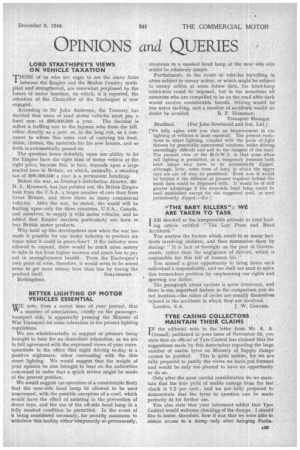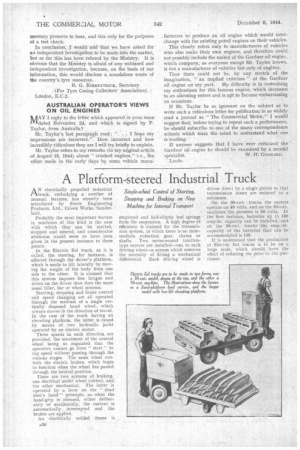OPINIONS and QUERIES LORD STRATHSPEY'S VIEWS ON VEHICLE TAXATION T HOSE
Page 31

Page 32

If you've noticed an error in this article please click here to report it so we can fix it.
of us who are eager to see the many links etween the Empire and the Mother Country multiplied and strengthened, are somewhat perplexed by the future of motor taxation, on which, it is reported, the attention of the Chancellor of the Exchequer is now engaged.
According to Sir John Anderson, the Treasury has decided that users of road motor vehicles must pay a
fixed sum of £90,000,000 a year. The decision is rather a baffling one to the layman who foots the bill, either directly as a user, or, in the long run, as a consumer to whom this extra cost of carrying his food, drink, clothes, the materials for his new houses, and so forth is automatically passed on.
The question bears definitely upon our ability to let the Empire have the right kind of motor vehicle at the right price, because this, in turn, depends upon a large market here in Britain, on which, naturally, a standing tax of £90,000,000 a year is a permanent handicap.
Before the war, as Dunlop's distribution director, Mr. H. L. Kenward, has just pointed out, the British Empire took from the U.S.A. a larger number of cars than from Great Britain, and three times as many commercial vehicles. After the war, he stated, the world will be waiting upon only the three countries, U.S.A., Canada, and ourselves, to supply it with motor vehicles, and he added that Empire markets particularly are keen to buy British motor products.
Why hold up this development now when the war has made it possible for our motor industry to produce six times what it could in peace-time? If the industry were allowed to expand, there would be much more money to take in tax from higher incomes and much less to pay out in unemployment benefit. From the Exchequer's own point of view, therefore, it would seem to be sound sense to get more money here than less by taxing the
product itself. STRATHSPEY. Rottingdean.
BETTER LIGHTING OF MOTOR VEHICLES ESSENTIAL WE note, from a recent issue of your journal, that " a number of associations, chiefly on the passengertransport side, is apparently pressing the Minister of War Transport for some relaxation in the present lighting regulations.
We are wholeheartedly in support of pressure being brought to bear for an immediate relaxation, as we are in full agreement with the expressed views of your correspondents to the effect that night driving to-day is a positive nightmare, when contending with the dim street lighting. We would suggest that the weight of your opinion be also brought to bear on the authorities concerned in order that a quick review might be made of the present position.
We would suggest (as operators of a considerable fleet) that the near-side head lamp be allowed to be used unscreened, with the possible exception of a cowl, which would have the effect of assisting in the prevention of direct rays, and the use of the off-side head lamp in a fully masked condition be permitted. In the event of it being considered necessary, for security measures, to withdraw this facility either' temporarily or permanently, reversion to a masked head lamp at the near side also would be relatively simple.
Furthermore,. in the event of vehicles travelling in areas subject to enemy action, or which might be subject to enemy action at some future date, the head-lamp restriction could be imposed, but in the meantime all motorists who are compelled to be on the road after -dark would receive considerable benefit, driving would be less nerve racking, and a number of accidents would no doubt be avoided, B. F. HORSMAN, Transport Manager Bradford. (For John Newbould and Son, Ltd.).
[We fully agree with you that an improvement in the lighting of vehicles is most essential. The present variations in street lighting, coupled with the pools of ,light thrown by practically unscreened windows, make driving exceedingly difficult and add to the dangers of the road. The present view of the M.O.W.T. is that even when full lighting is permitted, as a temporary measure both head lamps may have to be permanently dipped, although, later, some form of lamp in which the upper rays are cut off may be permitted. Even now it would be helpful if the diffusers at present required behind the mask slots could be dispensed with. It would be of still greater advantage if the near-side, head lamp could be used unshielded except for the suggeSted cowl, or used permanently dipped.—ED.] "THE BABY KILLERS": WE ARE TAKEN TO TASK • IAM shocked at the irresponsible attitude or your leading article entitled "The Lay Press and Road Accidents."
You analyse the factors which result in so many incidents involving children, and then summarize them by stating: "It is lack of foresight on the part of Governments, rather than the negligence of drivers, which is responsible for this toll of human life."
You missed a great opportunity to bring home each individual's responsibility, and we shall not start to solve this tremendous problem by emphasizing our rights and ignoring our duties.
The paragraph about cyclists is quite irrelevant, and there is-one important feature in the comparison you do not mention—the riders of cycles are usually themselves injured in the accidents in which, they are involved.
London, E.4. J. W. CORDER.
TYRE CASING COLLECTORS MAINTAIN THEIft CLAIMS IN the editorial note to the• letter from Mr. A. A. A Cressall, published in your issue of November 24, you state that an official of Tyre Control has claimed that the
, suggestions made by this Association regarding the large number of usable tyres on Ministry of Supply dumps cannot be justified. This is quite untrue, for we are fully prepared to justify the views we have put forward and would be only too pleased to have an opportunity to do so.
Only after the most careful consideration do we maintain that the true yield of usable casings from the test check is 7.2 per cent., and we are fully prepared to demonstrate that the tyres in question can be made perfectly fit for further use.
You also state that your informant added that Tyre Control would welcome checkieg of the dumps. I should like to know, therefore, how it was that we were able to obtain access to a dump only after bringing Patna
mentary pressure to bear, and this only for the purposes of a test check.
In conclusion, I would add that we have asked for an independent investigation to be made into the matter, but so far this has been refused by the Ministry. It is obvious that the Ministry is afraid of any unbiased and independent investigation, because, on the basis of our information, this would disclose a scandalous waste of the country's tyre resources.
R. G. KIRKPATRICK, Secretary (For Tyre Casing Collectors' Association). Leindon, E.C.2.
AUSTRALIAN OPERATOR'S VIEWS ON OIL ENGINES MAY I reply to the letter which appeared in your issue ividated November 24, and which is signed by P. Taylor, from Australia?
Mr. Taylor's last paragraph read : ". . . I hope My impressions are incorrect." How incorrect and how incredibly ridiculous they are I will try briefly to explain.
Mr. Taylor refers to my remarks (in my original article of August 18, 1944) about " crushed engines," i.e., the effort made in the early days by some vehicle manu
facturers to produce an oil engine which would interchange with the existing petrol engines on their vehicles.
This clearly refers only to manufacturers of vehicles who also make their own engines, and therefore could. not possibly include the maker of the Gardner oil engine, which company, as everyone except Mr. Taylor knows, is not a manufacturer of vehicles but only of engines.
Thus there could not be, by any stretch of the imagination, "an implied criticism" of the Gardner oil engine on my part. My difficulty is in restraining my enthusiasm for this famous engine, which increases to an alarming extent and is apt to &come embarrassing on occasions.
If Mr. Taylor be so ignorant on the subject as to write such a ridiculous letter for publication in so widely read a journal as "The Commercial Motor," I would suggest that, before trying to repeat such a performance, he should subscribe to one of the many correspondence schools which train the• mind to understand what one is reading.
If anyone suggests that I have ever criticized the Gardner oil engine be should be examined by a mental
specialist. W. H. GODDARD. Leeds.




















































